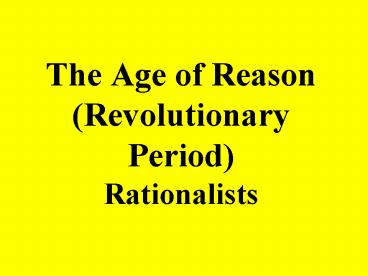The Age of Reason Revolutionary Period Rationalists
1 / 20
Title:
The Age of Reason Revolutionary Period Rationalists
Description:
The Age of Reason, or the Enlightenment, began in Europe with the ... Chowder, handy, bullfrog, hickory, skunk, etc. New spellings. Honour & humour = honor & humor ... –
Number of Views:78
Avg rating:3.0/5.0
Title: The Age of Reason Revolutionary Period Rationalists
1
The Age of Reason(Revolutionary
Period)Rationalists
2
The Age of Reason
- The Age of Reason, or the Enlightenment, began
in Europe with the - rationalist philosophers and scientists of
the seventeenth century. - Rationalism is the belief that we can arrive at
truth by using our reason - rather than by relying on the authority of
the past, on religious faith, or on - intuition.
- The emergence of modern science and the
scientific method had much to do with this new
emphasis on reason and free inquiry. - The Puritans vs
- Sir Isaac Newton (God as a clockmaker),
- René Descartes ( I think, therefore I am.),
3
1763
- End of the French and Indian War
- France and England war over control for of the
colonies - All happy at the end of the war
4
(No Transcript)
5
BUT
6
King George imposed regulations that colonists
felt unfair
- Stamp Act (raised taxes to pay war debt)
- Stamps burned, distributors beaten
- Stamp act repealed
- Other acts follow and colonist boycott- British
troops sent to Boston? leads to Boston Massacre
(five Americans killed when in a mob)
7
- Tea Act
- Bostonians dressed as Indians and dumped tea into
harbor - Coercive Acts
- Colonists later named then Intolerance Acts
- No regular public meetings
- Troops could use colonists homes
- Boston Harbor closed
8
- 1774- colonial leaders met in Philadelphia at the
First Continental Congress - 1775
- 700 British troops met 70 minutemen (8 Americans
died) - British moved to Concord where shot heard round
the world occurred - GAME ON!
9
- 1776
- Colonies declare Independence
10
- 1781
- French, African-American, General Washingtons
soldiers met Cornwallis who surrendered
11
Literature of the Period
- Public writings (as opposed to the private,
soul-searching of the Puritans) - Political speeches
12
- Some poetry
- Persuasive writings
- The arts grew
- Dramatic arts
- Portraits
- NOAH WEBSTER (post Revolutionary War)
- United States should have its own form of English
language - Traveled all over East and South, added words
- Chowder, handy, bullfrog, hickory, skunk, etc.
- New spellings
- Honour humour honor humor
- Musick publick music public
- Centre theatre center theater
13
Effects
- Patriotism
- Instill pride
- Common agreement about issues
- American character
- Teach values
14
Review
- Genre/Style
- Political pamphlets
- Travel writing
- Persuasive
- speeches
- Effects
- Patriotism
- Pride
- Agreement
- American character
- values
- Basic Beliefs
- Reason science over faith
- Man is naturally good, not evil
- Deism
15
? Deism ?
- The idea that God is not a power that controls
everything. - Saw God as more of a humanitarian, not vengeful
- He created the universe, but left it up to the
people to figure out how to work it, or to figure
out the natural laws. - Rationalists were deists and thought all could be
figured out through science. - Think of the on-going debate over evolution and
one gets pretty good picture of how Puritans and
Rationalists differ.
16
Most Influential Writers
- Benjamin Franklin
- Thomas Jefferson
- Thomas Paine
- Patrick Henry
17
Thomas Paines Common Sense was such an appeal.
Published in 1776, it was the most influential of
many Revolutionary pamphlets and was read by
virtually every American within months of its
appearance. The very phrase common sense had
come to mean the reasoning ability that all
people share. Paine argued that we should seek
independence in order to restore the natural
rights that were evident to our reason but that
had been taken away from the British. Tis
repugnant to reason, he wrote, to the universal
order of things, to all examples from former
ages, to suppose that this continent can long
remain subject to any external power.
18
Benjamin Franklins Autobiography
- The unquestioned masterpiece of the Age of Reason
- Franklin used the personal narrative, a form that
was common in Colonial America. He separated it
from much of its religious justification (the
Puritan impulse toward self-examination). Then
he molded it into what became a classic American
pattern the rags-to-riches story. - Written in clear, witty prose, this charming
account of the development of a self-made
American provided the model for a story that
would be told again and again. It appears in the
moralistic stories about the office boy by
Horatio Alger and in F. Scott Fitzgeralds The
Great Gatsby.
19
-from Benjamin Franklins Autobiography
I never doubted the existence of the deity, that
He made the world, and governed it with His
providence that the most acceptable service of
God was the doing good to man that our souls are
immortal and that all crime will be punished and
virtue rewarded either here or hereafter these I
esteemed the essentials of every religion, and
being to be found in all the religions we had in
our country I respected them all.
20
Lets take a look
- Page 125 (quote)
- Page 126 (timeline)































